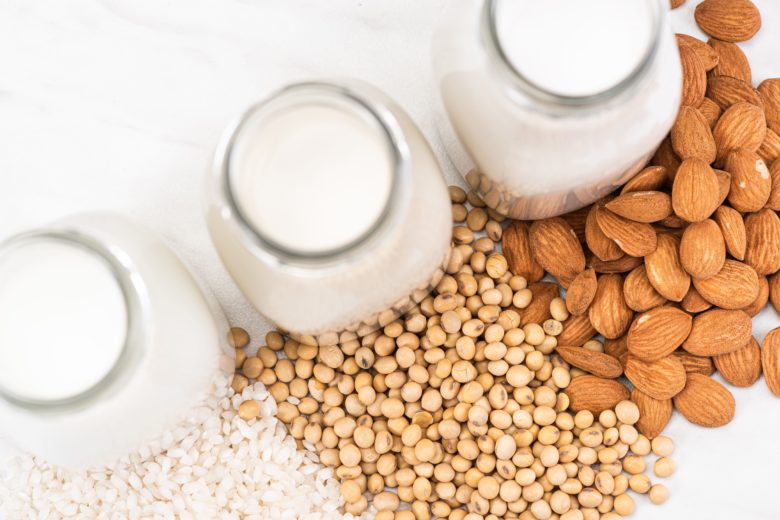
There is a wealth of dairy substitutes available made from a variety of plant sources. Here is a brief overview of different dairy-free options and their distinct characteristics and benefits:
Soy
Soymilk is the “original” replacement for cow’s milk, with its beginnings in China where it has long been used as both a sweet and savory beverage. This is the only milk alternative that naturally has the same amount of protein as a cup of milk — 8 grams — and most companies fortify with vitamins A, D, B12 and calcium. As will all milks, choose unsweetened to avoid added sugars.
Almond
With many people also avoiding soy due to allergies or other health conditions, almond milk has come to equal or surpass soy in its popularity. It is touted for being lowest in calories. Depending on the brand, an unsweetened cup has between 30 and 50 kcals. Though fortified with the same three vitamins and calcium, what almond milk lacks is protein, coming in at a mere 1 gram per cup. Several companies have started adding pea protein to provide 5 grams per serving. (Tip: Go for unsweetened or you could be looking at 90 calories and a whopping 16 grams of sugar!)
Flax
Flax milk has a similar nutrition profile to that of almonds, with very few calories (25 per cup) primarily from fat and no protein. Most commercial flax beverages are made by combining flax oil with water and then adding thickeners and emulsifiers to give a pleasant mouthfeel. One particular brand now has an option with added pea protein, so again like the almond beverage, it has 5 grams of protein per cup. Flax has the additional benefit of 1200 mg of omega 3s from alpha-linolenic acid (ALA).
Hemp
Like flax, this seed also contains around 1 gram of the ALA form of omega 3s. It naturally contains more protein at two to three grams per cup depending on the brand, but is still not a good source of protein. Out of all the non-dairy beverages, hemp seems to have a more earthy flavor that can turn some people away (or toward the sweetened versions).
Oat
If nut and seed allergies keep you searching for a safe substitute, oats may be the answer. This milk has a mild and pleasant flavor and the additional benefit of 2 grams of fiber per serving. There is a decent amount of protein but the naturally occurring sugars make this a high-carbohydrate choice.
Rice
Though non-allergenic, rice milk is high in carbohydrates and sugar, void of protein and has a watery consistency. Of all the alternatives, this has the least favorable nutrition profile.
Coconut
Coconut milk beverage (as opposed to coconut milk from a can or coconut water) is made by blending coconut cream with water for a delightful though faint taste of coconut. This milk has no fiber, sugar or protein, so the calories are coming from the natural fat of the coconut. With fewer nutritional benefits compared to most other dairy-free beverages, I tend to forego this product and prefer to use canned lite or full-fat coconut milk for curries, soups and desserts.
Depending on your preferences when it comes to taste, texture and nutrition, you may settle on one go-to milk substitute, or you may end up finding unique uses for a number of them. Personally, I like soy milk for baking, almond milk as a beverage, and flax milk poured over a medley of berries.
Almond Milk
Recipe developed by Michaela Ballmann, MS, RD, CLT
Ingredients
1 cup raw almonds (preferably soaked overnight)
3-4 cups water (depending on desired consistency)
1 teaspoon vanilla extract
pinch of sea salt
2-4 dates, pitted (optional)
Directions
- Place almonds and water in a blender. Blend on high for 1-2 minutes.
- Strain using a nut milk bag or cheesecloth, squeezing to get as much liquid out and retaining the almond pulp for other recipes.
- Put the milk back in the blender along with the vanilla, salt and dates (if using). Blend briefly until smooth.
- Chill and use over the next three days or so.




